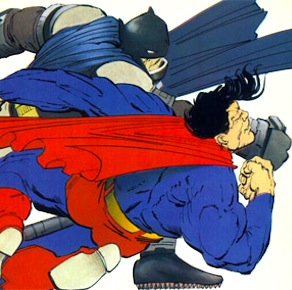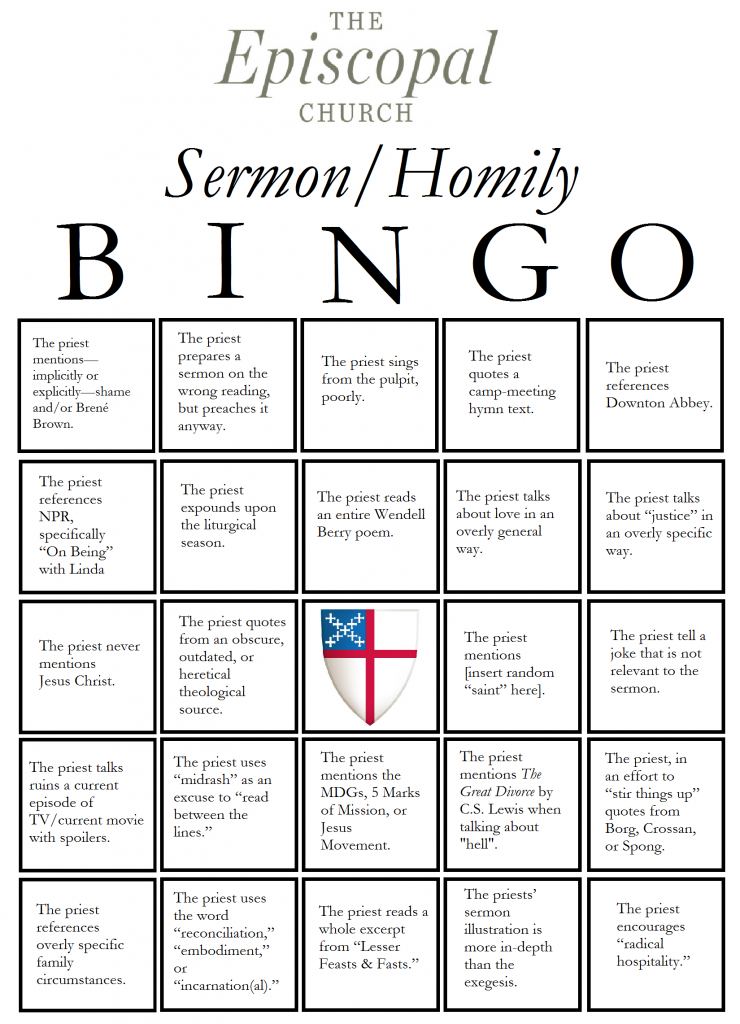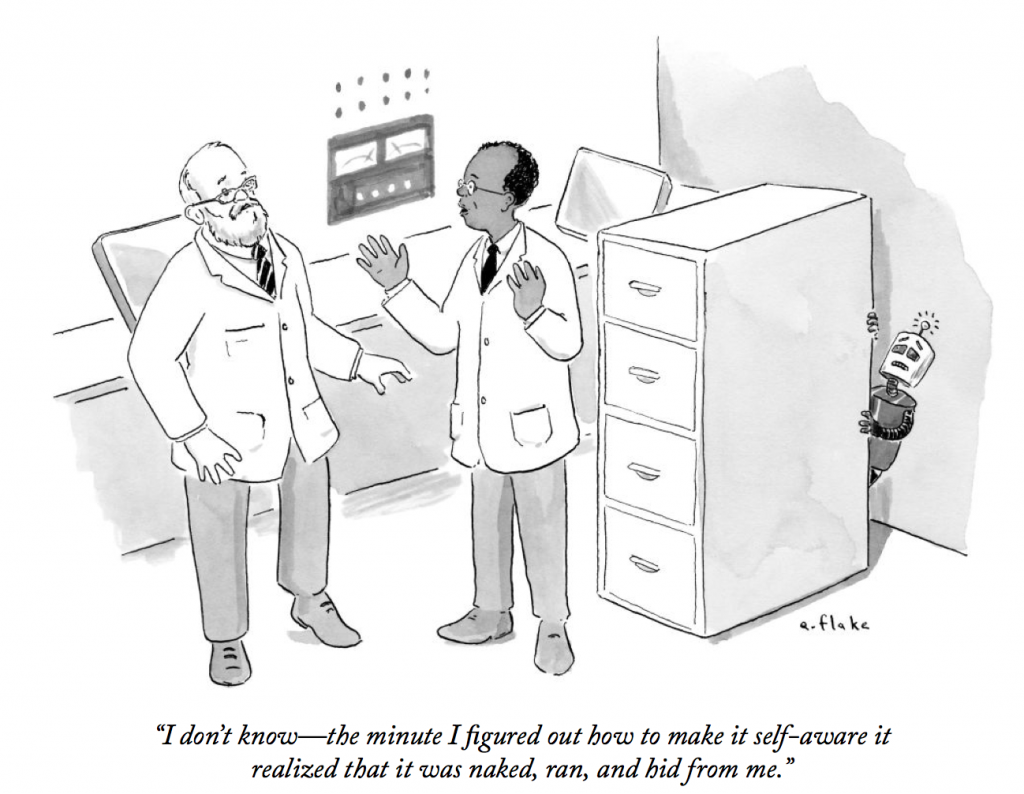
Click here to listen to the accompanying episode of The Mockingcast. It’s a special one.
1. This first one got me in the gut, as I bet it will anyone who grew up watching Mr. Rogers’ Neighborhood. NPR’s StoryCorps interviewed Francois Clemmons this week, who played the role of friendly Officer Clemmons on the series for over 25 years. It turns out that Clemmons was the first black actor to have a recurring role on an children’s television series. I had no idea. But what makes this so poetic is that Mr Rogers had him play a policeman, AKA a representative of law (enforcement). It was not an easy thing for Clemmons to do, given how police officers were viewed in his own neighborhood, i.e., as arbiters of oppression and cruelty. Rogers was clearly going out on a limb to cast him, yet I suspect he knew what he was doing, not only subverting the law, but combining two kinds of “other” into a single character, to borrow Bryan’s terminology–blacks at the time being “other” to the police, and the police being “other” to the blacks. Which is where the grace comes in. I almost saved it for Maundy Thursday but just couldn’t wait, ht WL:
“I grew up in the ghetto. I did not have a positive opinion of police officers. Policeman were siccing police dogs and water hoses on people,” he says. “And I really had a hard time putting myself in that role. So I was not excited about being Officer Clemmons at all.” Still, Clemmons came around to it eventually and agreed to take on the role.
And, in the decades he spent as part of the show, there’s one scene in particular that Clemmons remembers with great emotion. It was from an episode that aired in 1969, in which Rogers had been resting his feet in a plastic pool on a hot day. “He invited me to come over and to rest my feet in the water with him,” Clemmons recalls. “The icon Fred Rogers not only was showing my brown skin in the tub with his white skin as two friends, but as I was getting out of that tub, he was helping me dry my feet.”
He says he’ll never forget the day Rogers wrapped up the program, as he always did, by hanging up his sweater and saying, “You make every day a special day just by being you, and I like you just the way you are.” This time in particular, Rogers had been looking right at Clemmons, and after they wrapped he walked over. Clemmons asked him, “Fred, were you talking to me?”
“Yes, I have been talking to you for years,” Rogers said, as Clemmons recalls. “But you heard me today.”
“It was like telling me I’m OK as a human being,” Clemmons says. “That was one of the most meaningful experiences I’d ever had.”
Wow. There you have it. And before you cry Stuart Smalley, remember that Mr. Rogers was an ordained clergyman. As such, there’s every reason to believe that he was coming from a place of conviction here re: what the Christian faith says about human identity. Not just that we ought to love our neighbor, but that the water of baptism cleans more than one’s feet. As a result you are not who others see you to be, or who the law condemns you to be. You are not even who you see yourself to be. You are who God sees you to be, which is a forgiven sinner, a child of God, a son in whom he is well pleased. God in this case being Mr. Rogers, ‘natch.
2. On a more tenuous note, esteemed critic Leon Wieseltier really went to town in The Atlantic on A.O. Scott’s new book, the one we highlighted a few weeks ago. He sees it as emblematic of a fashionable cowardice:
This Korean church likes its Jesus in shape!
The interest of Scott’s book lies not in its contribution to the solution of the problems it treats, but in its exemplification of our moment in American culture and American cultural journalism. It is an accurate document of the discourse of “takes.” This movie, that book, this poem, that painting, this record, that show: Make a smart remark and move on. A take is an opinion that has no aspiration to a belief, an impression that never hardens into a position. Its lightness is its appeal. It is provisional, evanescent, a move in a game, an accredited shallowness, a bulwark against a pause in the conversation. A take is expected not to be true but to be interesting, and even when it is interesting it makes no troublesome claim upon anybody’s attention. Another take will quickly follow, and the silence that is a mark of perplexity, of research and reflection, will be mercifully kept at bay. A take asks for no affiliation. It requires no commitment.
Again, we’re back at the triumph of the subjective. Because to commit to a defined position entails denouncing opposing ones, or at least adopting a framework where not every point of view is equally valid, and where honest-to-God value judgments become inescapable. Which, as we all know, has come to be seen at the height of tackiness. One wonders, then, if the deeper fear informing our aversion to intellectual commitments is that of being contained in specific set of beliefs and therefore trapped in a discernible self. If we can be pinned down, then we can be judged and possibly found lacking, probably another way of talking about a fear of death a la DFW. Of course, whether this has anything to do with Scott’s book, who can really say? (Forgive me).
3. On a somewhat related note–i.e., pinning people down, unfairly in this case–Scott Jones was lucky enough to chat with author David Dark on this week’s episode of The Mockingcast, whose terrifically titled new book Life’s Too Short to Pretend You’re Not Religious is one you’ll be hearing about a lot in the coming months. It is fabulous fabulous fabulous, almost painfully good. The Englewood Review of Books has the first chapter up for free, and I commend it to you. The cast as well. Oh and those wanting to hear the unedited conversation with Dark should check out Scott’s new interview-centric podcast Give and Take. We’ve got a budding Charlie Rose on our hands!
4. Big news in the field of psychology this week as Roy Baumeister’s watershed theory of ego depletion–about which we’ve written quite a bit over the years–has come under unexpected scrutiny and may have even been debunked. Whether this is good or bad news for the willpower proponents out there remains to be seen. We’ll keep you updated. Unless our resolve wanes and something else captures our attention…
5. In “humor”, Mallory Ortberg’s WHY ARE YOU LONELY: A TEXT GAME” is devastating. For example, two possible answers she lists are CONSTANTLY LIE ABOUT YOUR FEELINGS THEN WONDER WHY YOU FEEL LIKE NO ONE KNOWS YOU or THINK YOU’RE BEING PLAYFUL BUT ACTUALLY YOU JUST GET MEAN WHEN YOU DRINK. Another one that’s more “oooof” than funny is The Episcopal Sermon Bingo Card (below), which of course could be used for a number of other denominations as well. A couple cheap shots in there but it’s pretty uncanny, ht SC:

Speaking of Wendell Berry, his interview last week in The NY Times Book Review was pretty funny itself–about as contentious as could possibly be.
In the name of equal opportunity ridicule, on the evangelical side of the spectrum there’s The Babylon Bee, a brand new Christian satire site that has made me smile on a near hourly basis since it launched a couple weeks ago (not “ooof”-free mind you). A couple favorites thus far would be Man From Year 2249 Asks God For Time-Traveling Mercies and Man Recommits Life To Christ Just To Put Altar Call Out Of Its Misery.
6. In music, Brian Fallon of The Gaslight Anthem released his first solo record today, Painkillers, and from what I’ve heard so far, it rocks. To promote, he gave an interview to Rolling Stone in which he said something arresting about the hype that surrounded his once and future band. What he describes sounds like it was ripped from the pages of Law and Gospel, specifically the section on the nature of evaluation, and how easy it is for affirmation to turn into condemnation:
“That was a lot,” Fallon admits. “Especially the whole ‘saviors of rock’ thing. I mean, we were in our 20s at the time — I would look at guys like Bruce, who wrote Born to Run when he was 25, and all I could think was, I’m not writing anything like that. So in a way all the praise actually just made me feel worse about things.” To illustrate his point, he recalls an interaction with a journalist from that time: “I’m on the phone with this guy and he says to me, ‘People compare you to Bruce Springsteen. I don’t think you’ve written a song as good as “Dancing in the Dark” or “I’m on Fire.”‘ And all I could think was, ‘Me neither!'” Fallon laughs. “But it’s like, we never said those things about the band. You guys said those things about the band. We just wanted to play some music.”
7. Next, in television, maybe it’s all this election insanity but I’ve fallen completely under the spell of Borgen, the much loved Danish drama that takes the material of House of Cards, eurofies and then filters it through a Friday Night Lights sieve in the most watchable way possible. That is, it cuts the cynicism in half, double the smarts and pours in a lion-sized heart. No wonder Vanity Fair named it the best binge-watch option out there. (Eric and Tami may even have some competition in the “best marriage on TV” category). Elsewhere, Better Call Saul is off to a remarkable start, with Gilligan and Gould continuing to provide ethics professors everywhere the most entertaining teaching tool they’re ever likely to receive. As much as I admire Bobby Cannavale, while Vinyl shows promise, it’s a bit much thus far. Hopefully they can find a less coked-out pace and a bit more humanity amidst the flash. Favorite series on the air right now, though, is Togetherness, one of the two or three best things I’ve ever seen about adult male friendship. And the most recent episode contained a truly beautiful instance of father-son grace.
9. The podcast Imaginary Worlds anticipated the upcoming blockbusters Superman Vs Batman and Captain America: Civil War in an excellent episode entitled “Why They Fight”. With the help of some classic Dungeons & Dragons alignment charts, host Eric Molinsky offers a theory about why the most absorbing conflicts aren’t between Good and Evil so much as between different forms of Good. Hint: it has something to do with the Law. We get into this in more detail on The Mockingcast (thank God), as well as Sarah’s recent post on suicide.
9. Finally, the Social Science Study of the Week comes to us via The Pacific Standard: More Evidence of the Psychological Benefits of Choral Singing. To wit:
https://www.youtube.com/watch?v=_BaVMZAyohI
Strays
- In the performancism-run-rampant department, Erika Christakis highlights the fallout of “The Reversal of Child and Adult Roles” for The Atlantic. Oy vey.
- Camille Paglia has changed her mind about Trump.
- Stalwart Mbird contributor Jeff Hual just got back from a trip to Istanbul, where he spent extensive time in the new “Syrian quarter”, getting to know some of the refugees and witness their heartache. He and a friend put together a moving video about the experience, which you can view here. (They’ve also established a GoFundMe account to help).
- Last but not least, we sent out a big e-newsletter to those on our email list, unveiling the cover for the new issue of The Mockingbird (The Church Issue), which we “put to bed” yesterday. It’ll be available by the end of the month!


COMMENTS
3 responses to “Another Week Ends: Officer Clemmons’ Feet, Ego Depletion, Episcopal Bingo, Borgen, Togetherness, & Choral Benefits”
Leave a Reply














Re: both “Better Call Saul” and “Togetherness”, both shows are filled with multiple central characters who are deeply, deeply flawed……and I couldn’t possibly root for ALL of them any more than I do…..and a “Family Ties” cameo to boot!
I’ll be interested to read how Dark handles the manic feedback loop that many people (me and I assume others) experience in trying to break down boundaries between the compartments of life, i.e., “Am I being spiritual enough at my job at all times?”
Also, I love that Dark uses the word “religion,” because I get really tired of people pitting Jesus vs religion.
Thanks for passing it along!